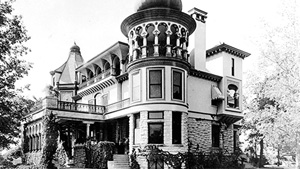From Proud Heritage, Vol 1 by DCPA, not currently in print.
Charles Barker, son of John and Sarah, (called Sally), was born at Oxford, North Carolina May 23, 1819. His brothers and sisters were Thomas Ricks, William, James, Wilson, Ambrose, George Washington, John Green (called Jack) and Sally Powel, twins, Martha, and David Tillman Barker.
At the age of 23 Charles married Eliza Joyner on January 18, 1842 in Franklin County, North Carolina. Eliza, the daughter of Samuel and Elizabeth H. Jones, was born March 19, 1820.
On September 13, 1852 several families began a journey from North Carolina to Texas in covered wagons. The Barkers were one of these families. Charles, a very religious man, believed that his family should not travel on the Sabbath. Instead they observed Sunday, resting themselves and their livestock.
Conditions were terrible. The roads were poor and often muddy. The heavy wagons loaded with valued possessions made the journey even more difficult. To alleviate the burden on the horses, the women and children walked beside the wagons at times. The journey was very hard; many, being discouraged by homesickness and discomfort, turned back, while others simply dropped off along the way.
Only one wagon reached Dallas County. On December 13, 1852, Charles Barker, his wife Eliza, and four small children arrived at their future home. They crossed the Trinity River exactly three months from the day they began their journey.
They camped for the night at the crossing intending to go farther west. That night they met James Horton traveling to his new home near Eagle Ford. Horton stopped in the misting rain, to talk to the newcomers, advising them not to travel anymore until spring. He offered them the use of a cabin on his property and they accepted.
The Barkers stayed throughout the winter. Impressed with the area, they rented land from Horton for the year 1853. From their cabin, Charles Barker wrote his first letter to his family back home in Carolina to tell them of Texas. This original letter is still in the family. It was awarded a “First Place” at the Texas Centennial Exhibit in 1936 when it was submitted by his great-grandson George W. Vinyard. (See “History of the Cedar Mountains” by Lucretia Barker Vinyard for an exact copy of this letter at the Dallas Public Library.)
In the Spring of 1853 Barker and Horton left for a cattle roundup a few miles south. Looking at this fresh bluebonnet-covered land, Charles bought 300 acres from Horton. This land was patented by virtue of a certificate issued to Edward H. Paxton by the Commissioners of Peters Colony. The certificate was transferred by Gov. Pease to James Horton in 1852, and it was deeded to Charles Barker in 1854.
On this land, Barker built a large one-room, two-story white rock house. He hauled what little lumber he used from Groesbeck, Texas by wagon. During the first winter the family used parts of their tent for doors and windows. They cooked by making fires in the middle of the room on the dirt floor. The following year a fireplace and room-dividers were added.
The Barkers reared eight children: Etna Ann, who died young; Sarah Elizabeth (Bettie) married Judge Rhodes; Richard Taylor married Jane Rhodes; Lewis LeRoy married Fannie Ferguson and had three children: Ophelia married Will Hale, Annie married Charles Grimes, Leslie; Charles Thomas married Anna Jane Pelt and had two children; John Samuel married Mattie Spain; Martha Carolina married Samuel Graves; and James William married Martha Neely, daughter of George W. Neely, Dallas County Commissioner.
Lucretia, daughter of Charles Thomas married Charles Oliver “Tod” Vinyard. Her sister, Ella Carolina, married Charles W. Cox. James William and Martha’s children were George, Richard and Cabell P. Barker. Cabell lived on the homeplace until shortly before his death in 1974.
Charles Barker was instrumental in the establishment of early Methodism in Dallas County. He was unanimously elected Church Secretary in December 1866 at Wesley Chapel and served until 1874. This chapel was located at what now is U.S. Highway 67 and Camp Wisdom Road, and was the first Methodist Church west of the Trinity in Dallas County.
In 1873 Charles Barker was elected Justice of the Peace. Other officials at this time were Alexander Howard, James N. Barkley, John D. Kerfoot, Thomas Coats, Thomas L. Franks, and William Sproules.
The Barkers lived all their lives on this land. Charles died December 14, 1895 and Eliza died ten years later October 22, 1905. They are buried at Little Bethel Cemetery, Duncanville, Texas.
By Zelda Vinyard Johnston, Duncanville


